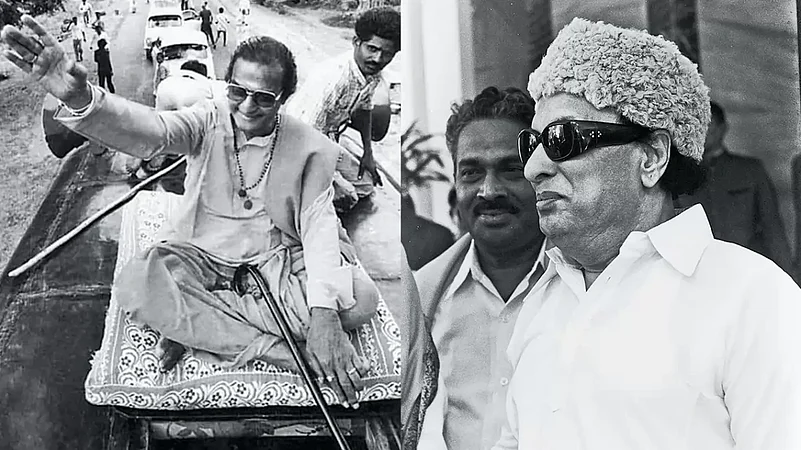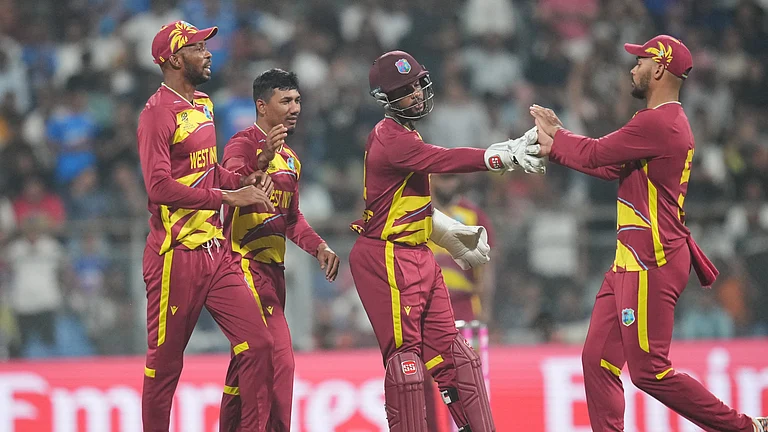Last week, Kannada actor Kichcha Sudeepa announced that he would campaign for the Bharatiya Janata Party (BJP) in the upcoming state elections. Karnataka goes to polls for its state assembly on May 10th this year. Sudeepa is personally close to Karnataka Chief Minister Basavaraj Bommai, whom he calls mama (uncle). Later, he clarified that he wasn’t joining the BJP or standing for elections.
Popular Kannada actors have rarely endorsed a political party in Karnataka. So Sudeepa’s move came as a surprise to many. The scene is very different in Tamil and Telugu cinema.
In Tamil Nadu, superstar M G Ramachandran was attracted to the Dravidian movement of C N Annadurai. After falling out with his contemporary M Karunanidhi, who was also an established film writer, MGR started his own party called the All India Anna DMK (AIADMK). MGR was chief minister of Tamil Nadu from 1977 till his death in 1987.
In undivided Andhra Pradesh, actor N T Rama Rao started the Telugu Desam Party (TDP) in 1982. His slogan was “Telugu Vari Atma Gauravam” (Telugu People’s Self Respect). He used an open vehicle for his campaign and called it a Rath Yatra (chariot procession). In 1983, NTR’s party won an absolute majority in the assembly elections.
In 1984, his Tamil Nadu contemporary, MGR, was unwell and couldn’t campaign for the AIADMK. AIADMK was in alliance with the Congress party which was NTR’s rival in Andhra Pradesh. Still, NTR went to Tamil Nadu to campaign for his friend MGR. That year MGR’s party won by a thumping margin.
Kannada actor Rajkumar shared a great rapport with both MGR and NTR. He had the same stature across Karnataka that those actors enjoyed in their states.
The Union government at that time had imposed a three-language formula on all states. Many English medium schools in Karnataka didn’t offer Kannada as a language. A government committee, under Jnanpith award-winning writer V K Gokak, recommended that Kannada should be made a compulsory language from the primary school level. The government was reluctant to implement these recommendations.
There were a number of protests, but the government ignored them. All this changed when Rajkumar entered the scene and extended his support to the agitation. Overnight, it turned into a mass movement. Even today the Gokak movement is seen as one of the most important events in Karnataka since 1947.
At that time, many in Karnataka expected Rajkumar to take the political plunge. However, the actor refused saying: “I know how to act, not to rule.”
In 2019, when actor Sumalatha Ambareesh stood for elections, there were speculations that Rajkumar’s son, the late Puneeth Rajkumar, would campaign for her. Puneeth followed his father’s example. He put a social media post that said “You know that I am not involved in politics. I identify myself with art and not with politics.”
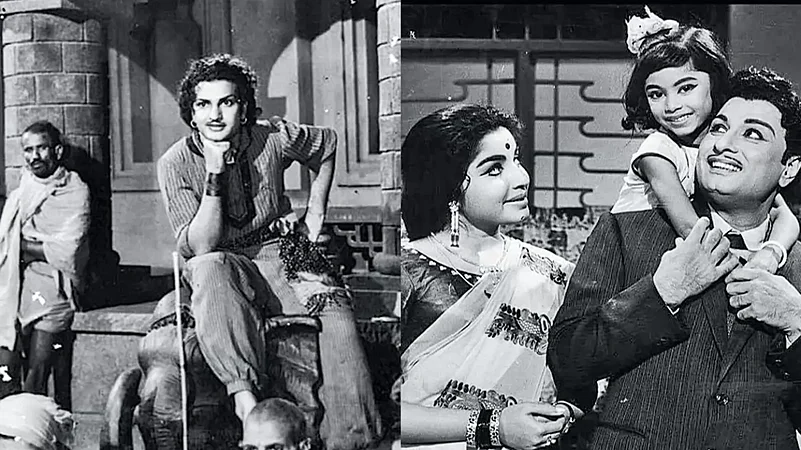
The one Kannada superstar who actually showed a keen interest in politics was Shankar Nag. As a student, he was an admirer of Jayaprakash Narayan and even brought out an underground newspaper against the emergency that was declared by former prime minister, Indira Gandhi.
He made his debut in the Kannada film “Ondaanondu Kaaladalli” directed by Girish Karnad that won him the National Award for Best Actor. Later, Shankar Nag became successful in mainstream cinema. He became a household name across India when he directed ‘Malgudi Days’ a Hindi TV series based on the works of R K Narayan.
Shankar Nag and his brother Anant Nag were both admirers of Janata Party leader Ramakrishna Hegde. Taking a page out of NTR’s style of campaigning, the Nag brothers travelled in an open vehicle canvassing for the Janata Party.
In 1990, Shankar Nag lost his life in a tragic car accident. Today, he remains a cultural icon for Kannadigas. His images can be found in every nook and corner of Karnataka, especially on autorickshaws. However, Shankar Nag never contested elections.
A year after Shankar Nag’s death, Anant Nag stood for elections for the Dakshina Kannada parliamentary constituency on a Janata Dal ticket. Iconic Kannada writer Shivarama Karanth stood in the same constituency as an independent. Both Karanth and Nag lost that election to G D Nayak, a Congress candidate.
A few years later, Anant Nag contested and won from Bengaluru’s Malleshwaram assembly constituency. He became a minister in the cabinet of Chief Minister J H Patel, a staunch socialist and a follower of Ram Manohar Lohia.
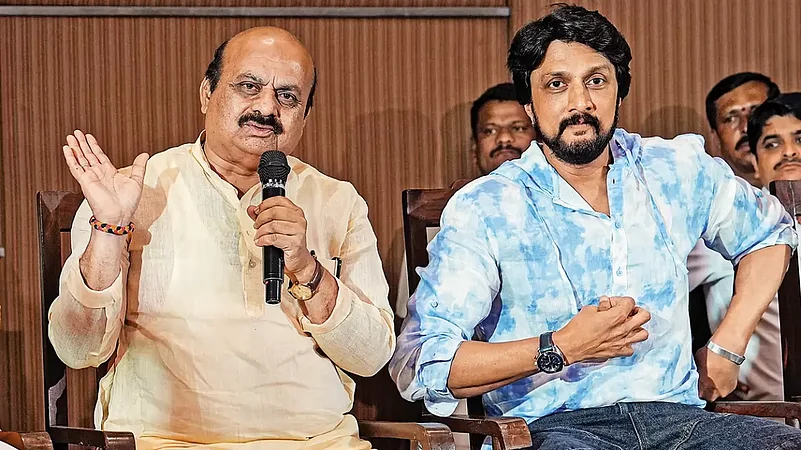
When the Janata Dal split, Patel stayed with Janata Dal (United). Anant Nag joined Deve Gowda’s faction called Janata Dal (Secular). In 2004, he contested from Bengaluru’s Chamarajpet constituency and lost to Congress leader S M Krishna. He distanced himself from politics for a long time, and only recently he joined the BJP.
Rajkumar’s other popular contemporaries were Vishnuvardhan and Ambareesh. When Ambareesh contested elections in 1997, his best years as an actor were behind him. Vishnuvardhan never showed any inclination for politics, but he campaigned for his close friend Ambareesh. Ambareesh became a Member of Parliament thrice from the Mandya parliamentary constituency. He even became a Minister of State in Manmohan Singh’s government. After his demise in 2018, it was assumed that the Congress would field his wife and actor Sumalatha from Mandya. In the 2019 General elections, JDS and Congress entered into a seat-sharing arrangement to counter the BJP. Under the arrangement, Mandya was conceded to JDS. The alliance chose Nikhil Kumaraswamy, actor and son of former Chief Minister H D Kumaraswamy, to contest from Mandya.
Sumalatha decided to stand as an independent. Superstars like Yash (of KGF fame) and Darshan, hit the campaign trail, canvassing for her. Sumalatha won by a resounding margin. The elections showed the impact big cinema stars can have on elections. But since then, Yash and Darshan have tried to stay away from election campaigns. While popular actors occasionally come out in support of individual candidates, they have largely stayed away from endorsing a political party.
Upendra, another popular star has been vocal on various social issues. But instead of joining any party, he started his own political outfit called Prajakeeya. Upendra wants to field candidates in the coming assembly elections against all parties.
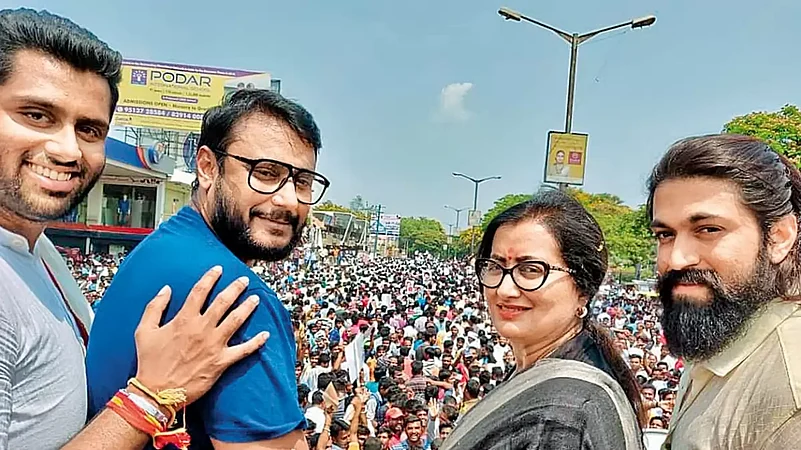
Like Upendra, most actors have tried to stay independent of established political parties. When Gauri Lankesh was murdered by suspected members of the right wing, actor Prakash Raj began to vehemently denounce right wing politics. When he decided to contest elections to Parliament in 2019, both Congress and AAP offered their support. However, he chose to stand as an independent and lost the election. But he continues to be vocal on the social media on various issues.
Kishore is another Kannada actor who has also made a name in other languages —like Visaranai (Tamil) and the web series “She” (Hindi). But he likes to be identified as a farmer. On his social media and in interviews, Kishore boldly attacks the government on issues concerning farmers and marginalised communities. And his criticism is not restricted to the ruling party alone.
On April 14, the Overseas Citizenship of India (OCI) card of US-born Kannada actor Chetan Kumar was revoked by the home ministry. In the recent past, Chetan has been twice taken into custody—once for his tweet about a judge who was presiding over the ‘hijab’ issue in Karnataka, and more recently, when he tweeted that “Hindutva is built on lies”. Chetan, who supports the cause of Dalits and Adivasis, has been outspoken against all the three political parties in Karnataka.
The picture is changing now. Today, , even in Tamil Nadu and Andhra Pradesh, actors no longer hold centre stage in politics. There are superstars like Rajnikanth and Kamal Hassan in Tamil and Pawan Kalyan in Telugu, but their impact on state politics so far has been marginal.
In the days of MGR, NTR and Rajkumar, the issue was about protecting regional identity. MGR stood for the Dravida movement. NTR stood for Telugu pride. Rajkumar lent his support for the Gokak agitation. In those times, the Congress, which was seen as the dominant party, was trying to centralise everything, impose Hindi and whose high command was making puppets out of state governments. Today, the BJP is in place where the Congress once was.
Popular actors, because of their mass appeal, are best placed to speak about issues of language and regional identity. It is that very identity that gives them a livelihood. But can they dare to speak out?
In the age of trolling and cancel culture, that comes at a price. Speaking at a Dasara event in Mysore recently, the Kannada actor Dhananjaya told the audience to develop “independent thinking”. He was quoting lines from respected Kannada writer Kuvempu. A few years ago, he had tweeted a quote from a Kannada poet saying “Be a human before anything else.”
A month after the Dasara event—when the actor’s film was released—he was relentlessly trolled on the social media about a scene in the movie. From the tone of most of those tweets, it was clear that they were not trolling him about the scene. They were targeting him for a different reason. His speech in Mysore and his tweet before that were seen as being anti-right wing. It was a concerted campaign to silence him.
Films involve huge investments. If an actor speaks out, his forthcoming releases can get trolled or boycotted. It is a choice between minding your career and speaking your mind. In the age of social media, that choice will only get tougher.
K M Chaitanya is a film director
(This appeared in print as Draw The Curtains)






